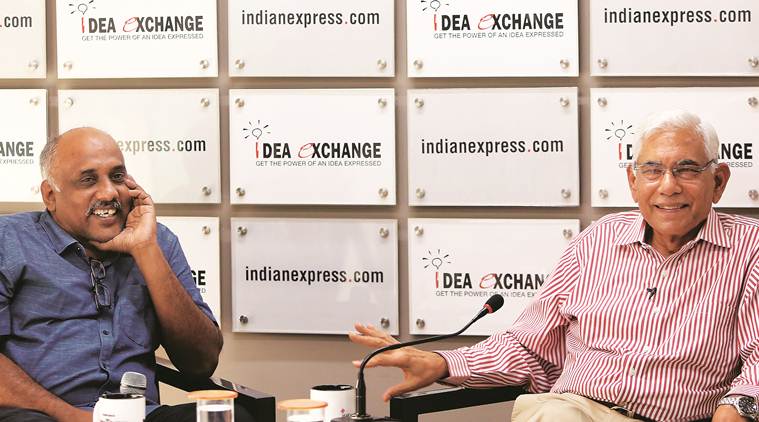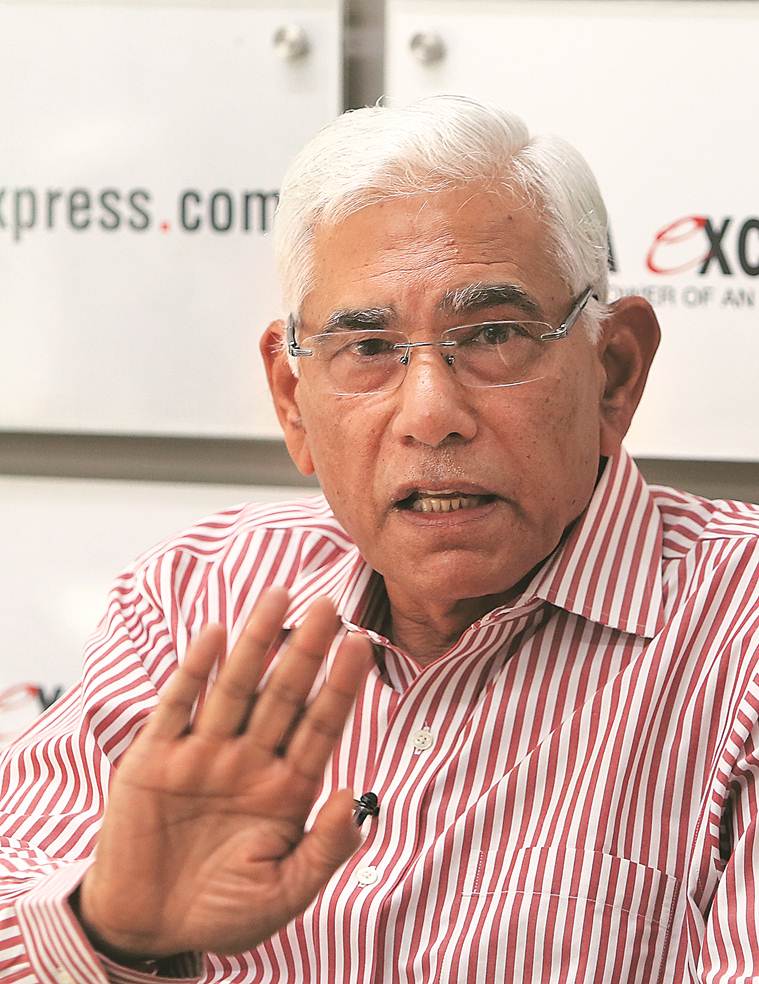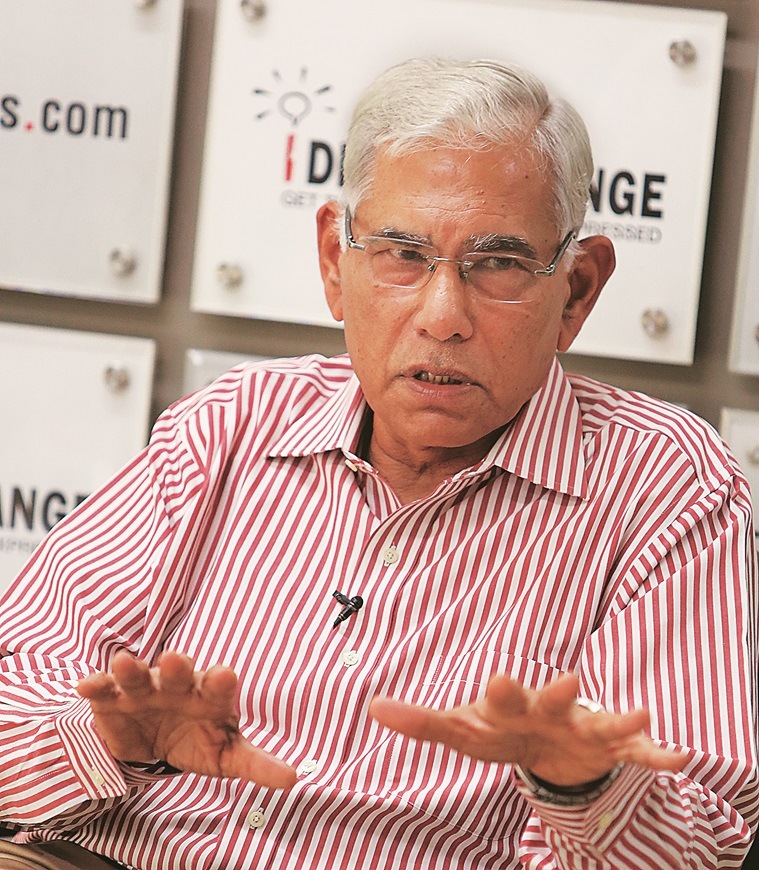
Why Vinod Rai
A former civil servant who was arguably India’s most famous Comptroller and Auditor General — after pegging the loss in the 2G scam at Rs 1.76 lakh crore — Vinod Rai is presently the chairman of the Committee of Administrators that is overseeing the country’s cricket administration. He has recently authored Rethinking Good Governance, a book on India’s public institutions. Entrusted with the task of implementing the Justice RS Lodha reforms, that promise far-reaching changes in Indian cricket, Rai, has held the road map in his hands as BCCI takes a radically new path and deals with the complex issues of conflict of interest and the role of politicians in sports
SANDEEP DWIVEDI: In the early chapters of your book Rethinking Good Governance, you talk about vertical accountability. You say how informal institutions have played a role in fixing government institutions while the State has not really curtailed corruption in big organisations. Can you elaborate?
On the issue of vertical accountability, or the institutions that you talk about, it’s not in the context of curbing corruption. What I have said is that theoretically there are two institutions of accountability — one is a formal institution, which is defined in terms of horizontal accountability, because these are institutions created by the government. There is the Comptroller and Auditor General of India (CAG) to watch over government expenditures, the Chief Election Commission to watch over elections etc. But, in the past 15 years, or in this millennium, there has been the (emergence) of institutions of vertical accountability which are informal, such as the media… The Indian media is very restrained and it is a positive. They are not looking into people’s bedrooms etc. There are also NGOs, PILs, which have been very positively active. Starting from the Board of Control for Cricket in India (BCCI), the 2G or coal scam… it was PILs that went into it.
The third section is citizen groups. Twenty years ago (during elections) we would have sat back in our drawing rooms, watched TV… Not many of us would have gone and voted. Today the same citizen has taken centrestage, and now actually goes to vote. All these institutions have introduced vertical accountability in the system.

RITU SARIN: You had written to the Prime Minister’s Office to expand government audit to include informal sectors such as NGOs etc. Did that happen?
At no point did we want to include the informal sectors. The CAG Act of 1971 says that wherever government funding finds its way, the CAG will chase the rupee. After 1971, the 73rd and 74th amendments created the panchayati raj institutions, municipalities and local self-government bodies… Now from the UPA-1 (onwards), parallel channels were established for devolving government funds on projects, and these funds were going through the panchayati raj institutions. I remember having discussions with (former Union minister) Jairam Ramesh… But unfortunately the legal audit mandate of the CAG was of 1971. These institutions were created much later. And, one-third of the money for projects was flowing through these channels. So say if we wanted to audit any municipality, they could have turned it down and said who are you, that the mandate of ’71 says that you cannot audit us. At the time, we made a presentation to the finance minister and Planning Commission, and pointed out the lacunae. Then, in 2009, they issued an order and said henceforth all local bodies to which government funds are being made available will also fall under the audit mandate of the CAG.
ABANTIKA GHOSH: Your book talks about the accountability of institutions. During your term as CAG, you estimated a loss of Rs 1.76 crore in the allocation of 2G spectrum licences to private players. But now most of those people who went to jail in the aftermath of the scam are back in Parliament. Do you think there are questions that the CAG needs to answer about its report on the scam?
Let me explain to you the difference between what happened in the trial court and what we did. See, the CAG of India conducts audits and does not do investigations. As far as the CAG is concerned, the (2G) chapter is closed.
The second activity that took place was the Supreme Court examining the licences. It had nothing to do with the CAG. In fact, if you read the SC verdict, it clearly says that we are not basing our judgment on the CAG report… That’s exactly the sentence they used. So the SC cut out all the extraneous information, and based its verdict entirely on the evidence that was produced before them. In their wisdom, after examining the details, they cancelled the licences.
Now, the third thing that happened was that the CBI picked up the criminality part of what happened in the issuance of those licences. The CBI conducts investigations. Their job is to pull out documents, evidences, witnesses and produce them, maybe, before the CBI court, which is a trial court. I don’t know how long they took. But they also have nothing to do with the audit, because audit reports have no evidentiary value in a court.
If you have read the judgment, the judge has made some very scathing remarks on the quality of evidence that was produced, and the quality of witnesses that were produced, on there being no connection between the chargesheet and the evidence that was produced. The words he used in the judgment were that the investigative agencies failed miserably. On that you cannot fault the CAG. I am making an assertion that if our audit team and me were given those documents again, I would come up with that figure (again).

SANDEEP DWIVEDI: There is a perception that as a sports administrator you have taken some populist measures. After the Pulwama attack, and before the World Cup, the BCCI wrote to the International Cricket Council to isolate Pakistan. You went on record to say that Pakistan should be treated the way South Africa was for Apartheid. ‘The present dispensation feels strongly about it because we reflect the sentiment of the nation. We are not a closed cricket community, we represent the nation,’ you said. But doesn’t this go against the Olympic Charter, where to play a sport is a human right?
I was coming to things step by step. Were you allowing Pakistani players in the Indian Premier League? You were not. Now, India was slated to play Pakistan on June 16… There was a rhetoric built up over here that India should refuse to play with Pakistan. People were saying it, the media was reporting it. The media was not cooking it up. The media reports, picks up news from the ground… There was a headline saying that the BCCI wants to go for revenues, and that is why they want to play Pakistan. I don’t want to name the television anchor… Now, faced with such a situation, what was my reaction? If we don’t play Pakistan (in the World Cup), we lose one point, two points, and that doesn’t matter. But suppose Pakistan comes up in the semi-final and we withdraw. Isn’t that shooting yourself in the foot? We would be closing avenues for ourselves. Which, I thought, was an incorrect move. So I said, rather than shooting ourselves in the foot, let’s isolate them.
SANDEEP DWIVEDI: During the World Cup, why did the BCCI write to the ICC seeking permission for M S Dhoni to wear wicket-keeping gloves with the ‘Balidaan Badge’, the regimental dagger insignia of the Army’s Special Forces? The request was turned down and it triggered a big media debate.
That was a non-issue. What he wore was not the insignia of his regiment. But he wore something… At that point, at least I did not know that the ICC had rules about what you can put on your gloves. I was taken by surprise. I said, look, if he is wearing it, he is free to wear it, and I supported him. Then I was shown 11 pages of ICC norms which say that you can only have your team’s insignia and that of the manufacturers. So we had to withdraw. It was a genuine oversight by me. Why should I name anybody else? I did not know that there are such instructions.

DAKSH PANWAR: Going back to the previous question, and just to make it clear, are you in favour of isolating Pakistan in cricket?
No. As I said I was taking a position to counter the rhetoric which had gained momentum in the public domain. That’s all. On playing Pakistan, I think there is a government policy…that you can play on neutral territory, and not on each other’s… We are very clear in our minds that on neutral territory we will play any country.
SUNIL JAIN: Many people are of the opinion that you are allowing the captain to decide everything… Virat Kohli didn’t want Anil Kumble to be coach. Then replacing Kumble with Ravi Shastri, who many argue was not the best coach. Your comments.
We took charge on January 30, 2017. In April, when we happened to be in Hyderabad for the first match of the IPL season, Kumble’s contract was produced before me. Kumble’s contract, or rather selection as a coach, was for a two-year period. The person selected then did not find favour… So Kumble was selected, but he was given only a one-year tenure. Kumble’s contract did not have a clause for extension. The issue that came up was not so much about what happened in the dressing room… It was if we have to extend Kumble’s tenure, how do we do it? I was in favour of an extension if it was found appropriate by a certain committee. I said please follow the process. That’s all. And, what was the process? Call for applications, go through an interview process, and select the right person. You can call me ignoramus, but at the time I did not know what happened between the captain and the coach.
SUNIL JAIN: How is Ravi Shastri as a coach?
Now, again, I don’t know how many coaches would have been superior to Shastri, but at least he has managed to keep the team fighting fit, battle-ready and cohesive in every respect. So I think he performed very well as a coach.
SANDEEP DWIVEDI: But there seems to be a problem with the coach selection process. Earlier, applications were invited and people applied. Ravi Shastri did not apply initially when Kumble’s contract was to be extended. Virat Kohli said that he doesn’t want Kumble. Then the BCCI CEO asked for fresh applications. That is when Ravi Shastri applied and got the position.
The reasons (for this process) have been recorded in writing… Only the application period was extended and two people applied — it was not only Ravi Shastri. The application period was extended by four weeks, if I remember correctly.

SHOBHANA SUBRAMANIAN: How seriously does the government take CAG audits? The National Highway Authority of India (NHAI), for example, did not set aside a mandatory half-yearly sum meant for liquidating long-term loans from its income in reserve fund, despite repeated prodding from the CAG.
I have commented on the efficacy of the committee system of Parliament. The CAG’s mandate ends the moment he has plugged its report. Then the PAC (Public Accounts Committee) pulls up the NHAI chairman and says please explain. Parliament has not been successful in enforcing its accountability over the Executive. Why? Because of the committee system (such as the Public Accounts Committee). The committee system has to be improved.
NIHAL KOSHIE: The Lodha Committee reforms say that people holding public offices, especially ministers, shouldn’t be in the BCCI. I’m asking this because the Union Home Minister, Mr Amit Shah, is the president of the Gujarat Cricket Association. Delhi MLA Om Prakash Sharma is a member of the executive committee of the Delhi and District Cricket Association. Don’t the Lodha Committee’s suggestions apply to these bodies as well?
It’s a valid legal issue. We have addressed it. We went right up to the amicus also to check on this issue and we were told that their tenure is till the time the AGM (Annual General Meeting) is held. When the AGM is held, they will have to demit office… There are four-five people. They will all demit office.
SANDEEP DWIVEDI: The Lodha Committee came out with certain clauses on the issue of conflict of interest. But there are several complaints about cricketers in this regard. Sourav Ganguly is president of the Cricket Association of Bengal, he is a commentator… Rahul Dravid is employed with India Cements…
In his report, Justice Lodha has given about 20 examples of conflict of interest. So the issues are very clear. We abide by them a 100 per cent. Since you took certain names… Sourav Ganguly is in conflict since he is president of the Cricket Association of Bengal. No dispute about it. Rahul Dravid was (in breach) because he was employed by India Cements. He has been made to stop that. You can check up. There is a resignation.
See, we believe that a cricketer is conflicted if he is employed or engaged in commentary for the BCCI. But if, say, you are doing commentary for a vernacular channel somewhere in Andhra Pradesh, and you had no dealings, you are a former player, why should you be in conflict? Now we wanted that issue to be cleared. I sincerely believe that it is a grey area. And the ethics officer, we believe, took a very narrow, legalistic view of what that conflict is. So we approached him for a reconsideration. He says, his mandate does not allow a review and you have to go back to the court.
In Sourav’s case, as long as he is president of CAB, he can’t be a member of the Cricket Advisory Committee.
TUSHAR BHADURI: The Committee of Administrators (CoA) was formed to implement the Lodha reforms. However, all we hear in the news is tussles within the body. Do you think you have got into details which were not your domain, like board administration and functioning?
I have read the (Supreme Court) judgment… (It says) the CoA has been nominated by the court… and that the administrators shall supervise the management of the BCCI. So you have no option but to do administration. The judgment has a few important points. First, that the administration of the BCCI will be done by the CoA. Secondly, for (implementation of) reforms, we started as a four-member body; two people left. We are now left with two people… It’s not necessary to be unanimous, you must have healthy discussions and debate. The only objection I have is that it should not come out in the public domain.
SANDEEP DWIVEDI: In April, the CoA approved travel plans for its own members to watch the June-July World Cup in England? Why were CoA administrators needed there?
We took a decision for office-bearers to go. It was for seven days. What do they do (there)? When they go there, they will watch the matches. Why shouldn’t a member watch the matches?… I can give you 16 different examples of why it’s good to go there. I did not go… Seven days in 45 days is not a big thing.
SUMIT JHA: If a captain, and not just in cricket but any other sport, is given powers to select coaches, doesn’t it take away from the game?
It’s good to have checks and balances. When a team performs badly, I don’t think it’s only the captain’s (responsibility). There are a lot of closed door discussions… To say that nobody held Virat Kohli responsible for the (World Cup) loss would be incorrect.